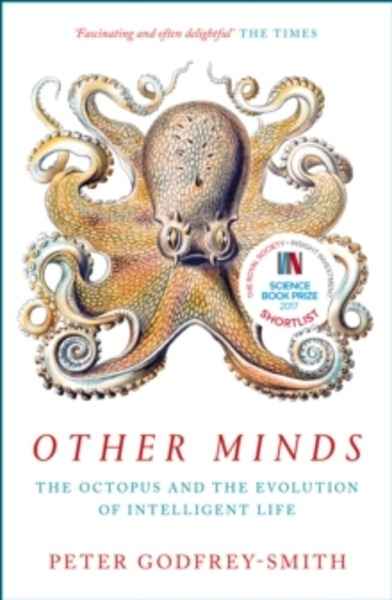Other Minds
The Octopus and the Evolution of Intelligent Life

Editorial Harper Collins
Fecha de edición marzo 2018 · Edición nº 1
Idioma inglés
EAN 9780008226299
272 páginas
Libro
encuadernado en tapa blanda
Resumen del libro
Brilliant' Guardian Waterstones Non-Fiction Book of the Month (March) SHORTLISTED FOR THE 2017 ROYAL SOCIETY SCIENCE BOOK PRIZE What if intelligent life on Earth evolved not once, but twice? The octopus is the closest we will come to meeting an intelligent alien. What can we learn from the encounter? In Other Minds, Peter Godfrey-Smith, a distinguished philosopher of science and a skilled scuba diver, tells a bold new story of how nature became aware of itself - a story that largely occurs in the ocean, where animals first appeared. Tracking the mind's fitful development from unruly clumps of seaborne cells to the first evolved nervous systems in ancient relatives of jellyfish, he explores the incredible evolutionary journey of the cephalopods, which began as inconspicuous molluscs who would later abandon their shells to rise above the ocean floor, searching for prey and acquiring the greater intelligence needed to do so - a journey completely independent from the route that mammals and birds would later take.
But what kind of intelligence do cephalopods possess? How did the octopus, a solitary creature with little social life, become so smart? What is it like to have eight tentacles that are so packed with neurons that they virtually think for themselves'? By tracing the question of inner life back to its roots and comparing human beings with our most remarkable animal relatives, Godfrey-Smith casts crucial new light on the octopus mind - and on our own.
Biografía del autor
x{0026}lt;P x{0026}lt;B Peter Godfrey-Smithx{0026}lt;/B es profesor de Filosofía en el Graduate Center de la City University of New York, y profesor de historia y filosofía de la ciencia en la Universidad de Sidney, además de un apasionado del submarinismo en las costas del sudeste australiano (sus vídeos de pulpos han aparecido en National Geographic y New Scientist). Ha publicado, entre otros libros, x{0026}lt;I Theory and Reality: An Introduction to the Philosophy of Sciencex{0026}lt;/I (University of Chicago Press, 2009), x{0026}lt;I Philosophy of Biologyx{0026}lt;/I (Princeton University Press, 2013) y x{0026}lt;I Darwinian Populations and Natural Selectionx{0026}lt;/I (Oxford University Press, 2009), que ganó el premio Lakatos en 2010.x{0026}lt;/P








